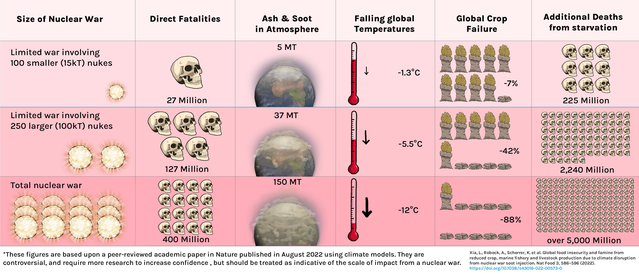- Survey study of awareness in UK and US populations also shows that brief exposure to latest data on ‘nuclear winter’ deepens doubts over nuclear retaliation.
- With risk of nuclear war now at its highest in decades, populations once again need to be educated on long-term climate effects of nuclear war.
In an opinion poll released by Paul Ingram, CSER Senior Research Associate, it was found that despite risks of a nuclear exchange being at their highest for 40 years, there is a lack of awareness among UK and US populations of “nuclear winter”, the potential for catastrophic long-term environmental consequences from any exchange of nuclear warheads. This sees detonations from nuclear exchanges throw vast amounts of debris into the stratosphere, which ultimately blocks out much of the sun for up to a decade, causing global drops in temperature, mass crop failure and widespread famine. Combined with radiation fall-out, these knock-on effects would see millions more perish in the wake of a nuclear war – even if they are far outside of any blast zone.

The survey, conducted online on 25 January 2023, asked 3,000 participants – half in the UK, half in the US – to self-report on a sliding scale whether they felt they knew a lot about “nuclear winter”, and if they had heard about it from:
- Contemporary media or culture, of which 3.2% in the UK and 7.5% in the US said they had.
- Recent academic studies, of which 1.6% in the UK and 5.2% in the US claimed they had.
- Beliefs held during the 1980s, of which 5.4% in the UK and 9% in the US said they still recalled.
The survey also presented all participants with fictional media reports from the near future (dated July 2023) relaying news of nuclear attacks by Russia on Ukraine, and vice versa, to gauge support in the UK and US for western retaliation. In the event of a Russian nuclear attack on Ukraine, fewer than one in five people surveyed in both countries supported in-kind retaliation, with men more likely than women to back nuclear reprisal: 20.7% (US) and 24.4% (UK) of men compared to 14.1% (US) and 16.1% (UK) of women.
The survey used infographics summarising nuclear winter effects laid out in a recent study led by Rutgers University (published by Nature in August 2022). Half the survey sample in each country (750 in the UK and US) were shown the infographics before they read the fictional news of nuclear strikes, while the other half – a control group – were not.
Support for nuclear retaliation was lower by 16% in the US and 13% in the UK among participants shown the “nuclear winter” infographics than among the control group. This effect was more significant for those supporting the parties of the US President and UK Government. Support for nuclear retaliation was lower by 33% among UK Conservative Party voters and 36% among US Democrat voters when participants were briefly exposed to recent nuclear winter research.
read 'Public awareness of nuclear winter and implications for escalation control'
Media Coverage:
- Public awareness of ‘nuclear winter’ too low given current risks, argues expert University of Cambridge
- The potential horrors of what a nuclear winter would really be like - as scientists call for 'urgent' public education Daily Mail
- No Sunny Days For A Decade, Extreme Cold And Starvation Forbes
- ¿Qué ocurre en una guerra atómica? "Muchos han oído hablar del invierno nuclear, pero muy pocos saben lo que es El Mundo
- Inverno nuclear é um risco pouco conhecido e isso é um problema actual, diz inquérito Azul
- Experts Warn That Public Awareness of “Nuclear Winter” Too Low Given Current Risks SciTechDaily